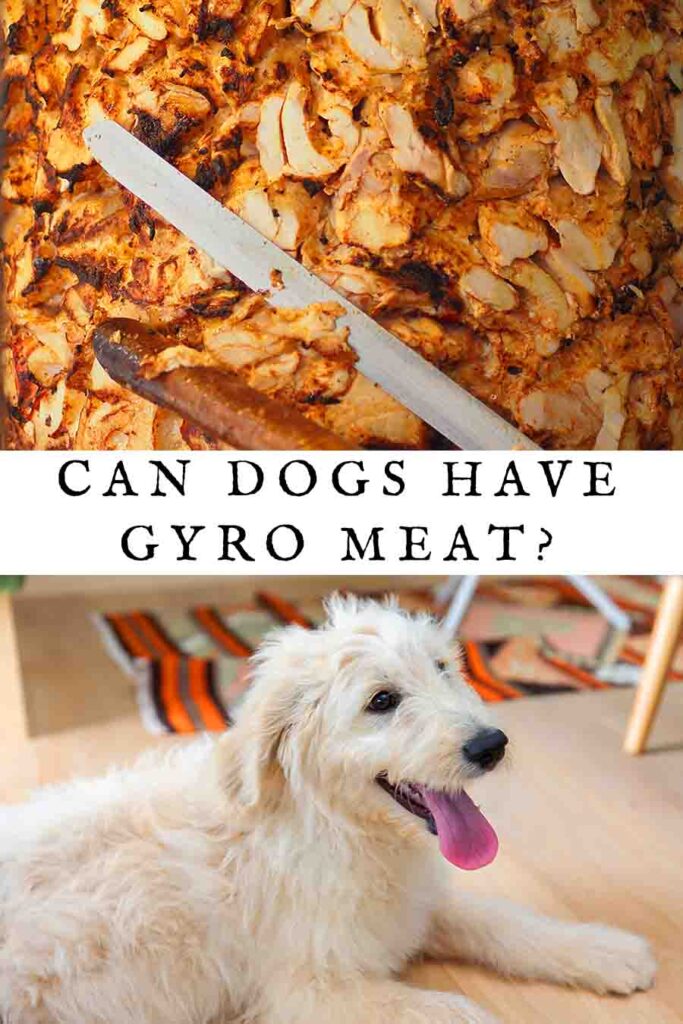Can dogs have gyro meat, or is this rotisserie treat best kept to yourself? Like meatloaf, practically everyone who cooks gyro meat follows their own unique recipe, meaning no two gyro wraps are exactly the same. But they almost always contain onions, garlic, and lots of seasoning like salt and cayenne pepper. All of which can harm your pup. So it’s not a good idea to share gyro meat with your dog unless you know exactly what has gone into it. Safety first, in all situations! But there are plenty of safer (and healthier) treats you can offer instead.
Contents
- What’s in gyro meat?
- Can dogs have gyro meat?
- Can gyro meat be harmful to dogs?
- How often is it safe for your dog to eat gyro meat?
- What you should do if your dog eats gyro meat
What’s in gyro meat?
Gyro meat originally comes from Greek cuisine. Authentic Greek gyro meat is called ‘gyros’, pronounced ‘yiross’. It usually consists of pork or chicken, cut into thin slices and marinated with herbs and spices. The slices are then stacked vertically on a spit, and grilled against a vertical broiler. When gyro meat landed in America, making it with a mix of ground lamb and beef instead became popular. And at some point the ‘s’ was dropped from the name and the pronunciation changed. Today, gyro meats are very similar in composition and preparation to their Arabic and Turkish cousins, shawarma meat and doner kebab meat.
As can be expected from a dish that’s been around for nearly 200 years, there are lots of rival recipes for gyro meat. Common ingredients in both traditional Greek versions and more recent American interpretations include:
- Lamb, beef, chicken or pork
- Plain yogurt
- Red or white onion (either fresh, or powdered)
- Garlic (either fresh, or powdered)
- Lemon juice
- Red wine vinegar
- Olive oil
- Oregano
- Thyme
- Ground coriander
- Cumin
- Sweet paprika
- Cayenne pepper
- Cinnamon
- Nutmeg
- Black pepper
- Salt
Can dogs have gyro meat?
Most gyro meats are not suitable for dogs to eat, because they contain onions and garlic as staple ingredients. Onion and garlic both belong to the allium plant family, and all alliums are poisonous to dogs. They contain a compound called N-propyl disulfide which interferes with the normal function of red blood cells, and ultimately causes them to break down. This leads to mild, moderate, or even lethal anemia, depending on dog, and the amount of onion or garlic ingested.

Can onion- and garlic-free gyro meat still be harmful to dogs?
Onion and garlic are the most universally and inevitably dog-toxic ingredients in gyro meat. But most recipes contain other ingredients that can also have harmful effects on your pooch.
- Meat
- Yogurt
- Seasonings
Meat
Dogs are specifically adapted to digest a high animal protein diet, but that doesn’t stand in the way of some individuals being allergic to some specific meats. For example, my own dog shows mild allergy symptoms in response to eating chicken. So gyro chicken is definitely off the menu for him!
Yogurt
Yogurt is a principal component of most gyro meat marinades, because it has powerful tenderizing properties. A delicious yogurt-based sauce called tzatziki is also slathered liberally on all the best gyros wraps. But yogurt contains lactose, a naturally-occurring sugar found in milk. Many dogs are not much good at digesting lactose, because they have very little of the enzyme lactase, which is needed to break it down. Signs that your dog has difficulty digesting lactose include vomiting, bloating, flatulence and diarrhea after consuming dairy produce.
Seasonings
Seasonings like cayenne pepper, black pepper, and large amounts of other spices like cumin can cause indigestion and heartburn in dogs, or irritate the lining of their intestines, leading to diarrhea. Furthermore, gyro meat is often high in salt, which helps lock in water and fat for extra juiciness. Unlike in humans, salt doesn’t directly increase blood pressure in dogs, but it can exacerbate other pre-existing health conditions. Eating too much salt in one go can also have poisonous effects. This is unusual, but the amount of salt needed to reach a toxic dose is relative to a dog’s size. So a small dog like a Miniature Labradoodle may experience symptoms of poisoning from just half a teaspoon of salt used to season a gyro dish.
How often is it safe for your dog to eat gyro meat?
Say you’re not keen on onions, garlic, or heavily seasoned food yourself. How often could you safely share gyro meat that you have prepared yourself and know contains no toxic ingredients with your dog? The answer is that gyro meat is still best saved as a very occasional treat, and then only offered in small quantities. Our dogs have very sensitive, specific nutritional needs, and replacing too much of their diet with homemade foods puts them at risk of malnourishment and obesity. As a rule of thumb, 90% of your dogs daily calorie intake should come from a nutritionally complete diet, approved by either the Association of Animal Feed Control Officials (AAFCO) or your veterinarian. All store bought kibbles, wet foods, or pre-prepared raw meals described as ‘nutritionally complete’ on the packaging are AAFCO approved. The remaining 10% can include treats, including small helpings of safely prepared gyro meat.
What you should do if your dog eats gyro meat
If your dog eats gyro meat from a gyro cart or an unknown recipe, call your veterinarian and let them know. They may recommend that you take them in immediately to induce vomiting, or give you instructions for monitoring your pup at home. Symptoms of salt toxicity usually appear within 2 – 4 hours, and include:
- Being sick
- Diarrhea
- Drinking lots of water
- Loss of coordination
- Tremors or seizures
- Loss of energy
Symptoms of poisoning from onion and garlic may appear more slowly, even after several days. They include:
- Diarrhea
- Being sick
- A sore belly
- Loss of energy
- Loss of appetite
Alternatives to gyro meat for dogs
Gyro meat that you haven’t prepared yourself using dog-safe ingredients is unlikely to be harmless treat for your pet. Here are some non-toxic alternatives:
- If you’ve bought chicken tenders at the store to make your own gyros at home, grill one without seasoning, and share that with your pooch.
- If you’ve bought a gyro wrap from a cart or restaurant, give your canine pal a tiny corner of pita bread, or one of the french fries/fried potatoes. I’m not advocating for these as healthy treats, but provided your dog is not allergic to them, they are at least non-toxic!
- And if your know in advance that you’re going to be in a position where you’ll be tempted to share gyro meat with your dog, have some store bought treats specifically intended for dogs with you, to give them instead.
Can dogs have gyro meat – summary
It’s best to adopt a general position that gyro meat is not safe for your dog to eat. Most recipes contain onion, garlic, seasonings and large amounts of salt, which can harm your pet. Other treats are safer, and your pup will appreciate them more.

